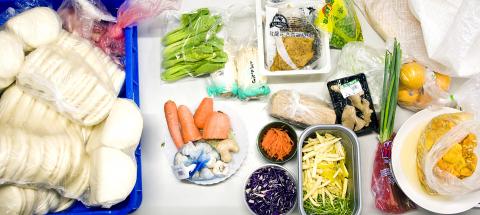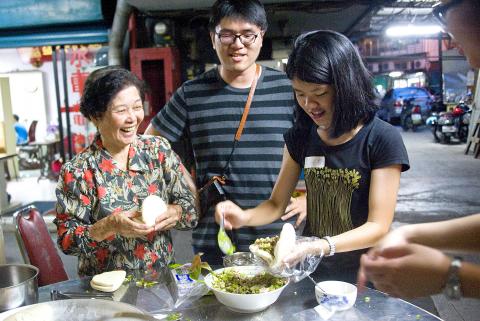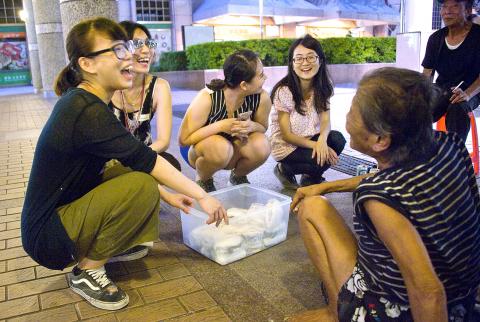Here are some eye-popping statistics: each person in Taiwan produces 96kg of kitchen waste per year, and each day enough food waste is produced in Taiwan to fill up 70 Taipei 101s.
A group of volunteers are trying to use a small portion of that waste for good. Armed with boxes of guabao (Taiwanese steamed sandwiches) and a large container of pumpkin soup, 15 volunteers arrive at dusk by Taipei Train Station, where the homeless are setting up cardboard beds, and split into three groups.
Earlier, before the volunteers departed their home base in Wanhua District’s (萬華) Nanjichang Residences (南機場公寓) in Taipei, one asked why they would need so many people to hand out what does not seem to be a large amount of food.

Photo: Han Cheung, Taipei Times
“You will see,” one of the organizers says. “There will be something for everyone to do.”
At the station, it is apparent that this is more than just a simple food distribution, as the volunteers do not just hand the food over and move on. They sit down and try to start a conversation. Many recipients do not respond, but some are more than happy to have someone to talk to.
One group approaches an elderly woman with disheveled hair and tattered clothes, sitting against a column in front of the station. She seems to recognize one of them.

Photo: Han Cheung, Taipei Times
“How do you do,” she says in English, taking a puff from her cigarette. They chat for about five minutes and she cheerfully poses for a few photos.
“I look so beautiful,” she says after looking through the shots. “Come see me every once in awhile, [it makes me] happy,” she says as her voice breaks.
Another woman tells volunteers about how her medical condition does not allow her to work and how she got cheated by her former employer, her eyes and tone of voice full of anguish.

Photo: Han Cheung, Taipei Times
“I’ve kept these things in my heart for so long and have not told anyone,” she says.
STONE SOUP
Earlier that afternoon, the volunteers arrived at the basement of the Nanjichang Residences to take part in Do You a Flavor’s (人生百味) monthly “Stone Soup Project” (石頭湯計畫). Most of the ingredients are either unsellable or leftover but still edible — donated by businesses, restaurants, farmers and families.
Today, the guabao bread is from a business owner who ordered more than he could sell. The chickens were donated by a neighboring poultry dealer, and the leftover vegetables are from an independent farmer.
Co-founder Chu Kuan-chen (朱冠蓁) says that there is not much legal interference obtaining leftover food. The challenges usually come from corporate policies in fear of liability.
Do You a Flavor has been operating on its own since July 2014, focusing on collecting leftover ingredients and making them into meals to distribute to the homeless, and also sharing it with volunteers to educate them about food waste.
“The food distribution is just a medium,” Chu says. “We hope to allow people to connect with other people. Once you meet one homeless person, you will stop thinking that they’re all the same. If you want to dislike them, that is fine too, but you need to really understand them first.”
Chu says the idea started during the Sunflower movement, where her friend noticed that a homeless person was turned down after asking for some of the surplus food and supplies donated to the activists inside the Legislative Yuan — even when much of it went to waste.
She and her friend spoke to the people handling the supplies and arranged to take a portion to distribute to homeless in Wanhua.
“When we decided to do that, a lot of outlandish images came into my head,” she says. “People who were unkempt and disheveled. People who had mental problems. I considered dropping the food in front of them and running away.”
But when she got there, she saw that these were just regular people — not so different from those old people she would see playing chess in the park.
Chu realized that it is not just food that is being discarded by society — it is people as well.
Chu and three friends launched their first Stone Soup Project by asking for donations online, receiving so much food that they were forced to do a second one. Last Sunday’s was number 26.
NEW HOME, NEW OPPORTUNITIES
In May, Do You a Flavor became part of the Nanji Rice (南機拌飯) initiative, which aims to revitalize and foster a sense of community in the abandoned basement market of the cramped Nanjichang housing project.
The number of organizations using the space is increasing, with the goal of making this a place that the residents — many of them elderly living alone — could gather, socialize and make use of the organizations’ resources.
Stone Soup is a monthly effort, but at their new home, Do You a Flavor volunteers now also run weekly community dinners (also using leftover food) targeted toward Nanjichang residents, distribute leftover vegetables to residents, help with craft projects set up by fellow Nanji Rice members and participate in as other initiatives.
Before any cooking begins, Chu and another co-founder spend about an hour talking to volunteers about food waste and homelessness.
Chu begins the presentation by discussing the disadvantaged in society and people’s perceptions of them, which she notes is the real issue they want to discuss.
WALKS OF LIFE
The volunteers last Sunday come from various backgrounds and different ages — from a high school student wanting to learn more about the homeless to a chef wanting to find something meaningful to do.
There is even a homeless man who comes and helps out every week and serves as a food distribution group leader at Taipei Main Station.
Meanwhile, the Nanji Rice community building project, only in its second month, seems to be working, as several elderly residents stop by to help with the food preparation while others come to eat and chat.
The organizers are trying out a new method by moving the cooking and eating to the already-established public places such as the temple on the first floor — as they noticed that many residents are reluctant to go downstairs to join a group of unfamiliar young people.
The volunteers even walk around and hand out surplus produce to residents while inviting them to join in the meal or help out.
“We noticed that many residents are retired and do not work, but they actually have expertise — maybe they used to run a restaurant,” Chu says. “We look for these people and ask them if they can share their skills.”
Teng Mei-hsiang (鄧梅香), who lives across the street, came to Nanjichang to buy cooking oil and ended up staying and helping prepare the food.
“I’m old and alone. I don’t have much to do or places to go,” Teng says. “But I can still move. I’ve been cooking all my life. I can help as long as people don’t think I’m a burden.”
After distributing food for about an hour, the volunteers regroup and form a circle, drink the remaining pumpkin soup and share their thoughts. Each person had his or her unique story to tell, from the homeless they interacted with to how their views changed through the experience.
And in the end, it really was not about the food after all.

Most heroes are remembered for the battles they fought. Taiwan’s Black Bat Squadron is remembered for flying into Chinese airspace 838 times between 1953 and 1967, and for the 148 men whose sacrifice bought the intelligence that kept Taiwan secure. Two-thirds of the squadron died carrying out missions most people wouldn’t learn about for another 40 years. The squadron lost 15 aircraft and 148 crew members over those 14 years, making it the deadliest unit in Taiwan’s military history by casualty rate. They flew at night, often at low altitudes, straight into some of the most heavily defended airspace in Asia.

Beijing’s ironic, abusive tantrums aimed at Japan since Japanese Prime Minister Sanae Takaichi publicly stated that a Taiwan contingency would be an existential crisis for Japan, have revealed for all the world to see that the People’s Republic of China (PRC) lusts after Okinawa. We all owe Takaichi a debt of thanks for getting the PRC to make that public. The PRC and its netizens, taking their cue from the Chinese Communist Party (CCP), are presenting Okinawa by mirroring the claims about Taiwan. Official PRC propaganda organs began to wax lyrical about Okinawa’s “unsettled status” beginning last month. A Global

Taiwan’s democracy is at risk. Be very alarmed. This is not a drill. The current constitutional crisis progressed slowly, then suddenly. Political tensions, partisan hostility and emotions are all running high right when cool heads and calm negotiation are most needed. Oxford defines brinkmanship as: “The art or practice of pursuing a dangerous policy to the limits of safety before stopping, especially in politics.” It says the term comes from a quote from a 1956 Cold War interview with then-American Secretary of State John Foster Dulles, when he said: ‘The ability to get to the verge without getting into the war is

Like much in the world today, theater has experienced major disruptions over the six years since COVID-19. The pandemic, the war in Ukraine and social media have created a new normal of geopolitical and information uncertainty, and the performing arts are not immune to these effects. “Ten years ago people wanted to come to the theater to engage with important issues, but now the Internet allows them to engage with those issues powerfully and immediately,” said Faith Tan, programming director of the Esplanade in Singapore, speaking last week in Japan. “One reaction to unpredictability has been a renewed emphasis on